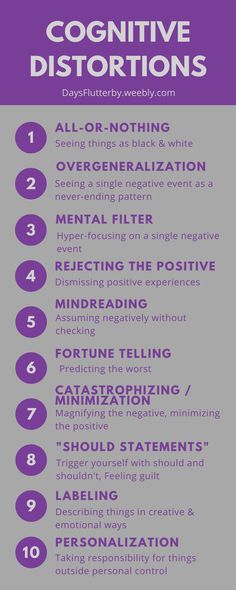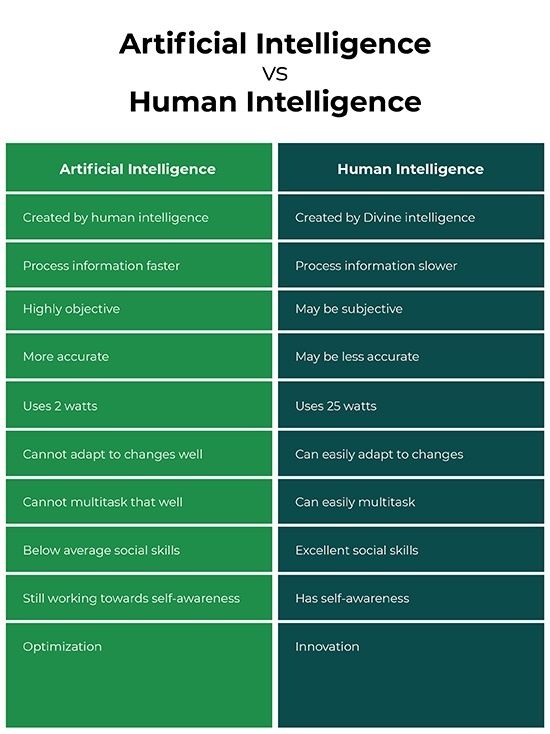Overgeneralization cognitive distortion
Understanding Overgeneralization — Therapy Now
The more we learn about the human brain, the more we understand the deep interrelations between various conditions. For instance, individuals who suffer from social anxiety disorder may find that their symptoms are worsened by a cognitive distortion called overgeneralization.
What Is Overgeneralization?
The American Psychological Association defines overgeneralization as, “a cognitive distortion in which an individual views a single event as an invariable rule, so that, for example, failure at accomplishing one task will predict an endless pattern of defeat in all tasks.” People with this condition take the outcome of one event and apply it as the inevitable outcome for all similar events.
Who Is at Risk for Overgeneralization?
While anyone can struggle with this cognitive distortion, it is more commonly seen in people with social anxiety disorder, as well as those with generalized anxiety, depression, and related conditions.
What Are the Symptoms of Overgeneralization?
To some extent, most of us are guilty of overgeneralizing at certain points. For instance, have you ever been frustrated while driving, only to be stopped by a red light and then fume because you’re “always” stopped at “every” red light? This is a good example of overgeneralization in daily life – you’re certainly not stopped by every single red light, every single time, but our brain makes it feel that way. For individuals who suffer from overgeneralization as a cognitive distortion, the situation is a little bit different.
Symptoms include:
Viewing negative experiences as a set pattern
Assuming one failure will predict ongoing failure in the same activity/task
Worsening negative self-talk
The feeling that you cannot do anything right
How to Overcome Overgeneralization
While overgeneralization can lead to negative outcomes in your life, cognitive behavioral therapy offers some strategies to address these challenges.
Know When It Occurs
One of the most powerful things you can do is recognize when it is happening. This can be challenging, as it requires that you become aware of your thinking while you are thinking it, but when done properly, you can learn to take a step back from the overgeneralization process while it is occurring.
Practice Mindfulness
Overgeneralization involves your thoughts. Therefore, when you are mindful of your thoughts, you can begin to notice patterns. Once you see those patterns, you can start to break them. Some people find it useful to keep a journal in which they record their thoughts so they can identify patterns more easily, as well as identifying overgeneralization triggers.
Look Deeply
An important step in dealing with overgeneralization is to look deeply at your thoughts and emotions, particularly when they are strong and negative. Ask yourself, “Am I sure?” or “Is this actually true?”.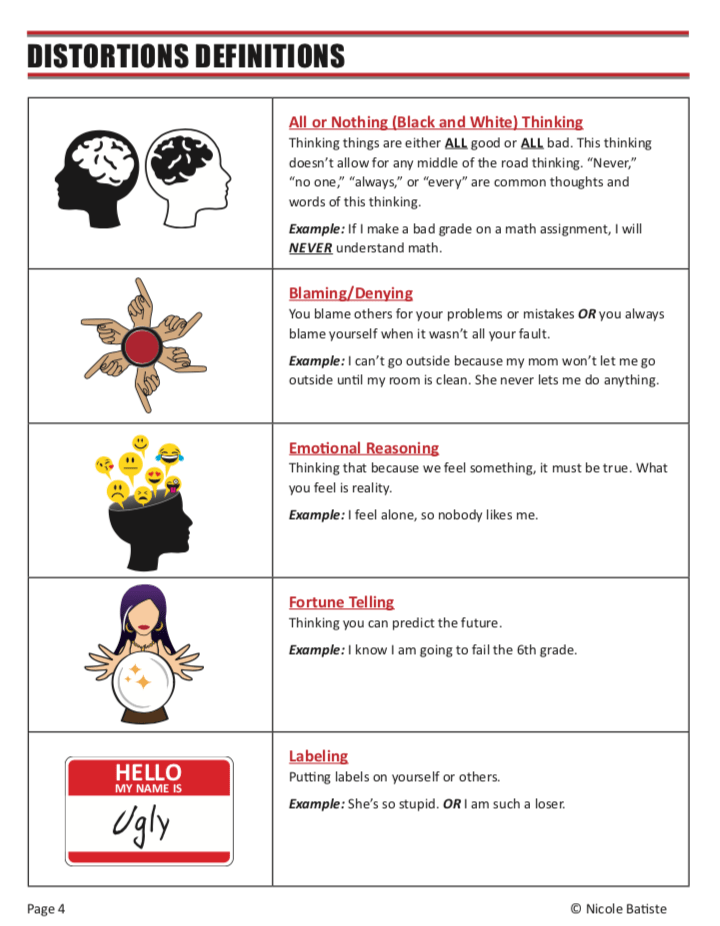 Ask whether someone else would see the situation the same way – challenge your thoughts and remember times when you succeeded rather than focusing on failures and negative outcomes.
Ask whether someone else would see the situation the same way – challenge your thoughts and remember times when you succeeded rather than focusing on failures and negative outcomes.
Ultimately, overgeneralization is a symptom of a larger problem, usually a type of anxiety. Addressing this single symptom may help alleviate others related to your anxiety, but addressing the core issue is also important.
Overgeneralizing — Cognitive Behavioral Therapy Los Angeles
What is Overgeneralizing (aka overgeneralization), And How Do I Stop Doing It?
Overgeneralizing is a cognitive distortion, or a distorted way of thinking, that results in some pretty significant wrong assumptions. A great deal of unnecessary emotional pain is caused by distortions such as overgeneralization. Overgeneralization is often implicated in clinical depression, anxiety disorders, and anger management problems. Making a broad assumption about something from limited experience is the definition overgeneralizing.
Overgeneralization Examples
Overgeneralization can take many forms. We may, for example, predict the outcome of something based on just one instance of it:
After going on a job interview and finding out we didn’t get the job, we conclude we’ll never get a job (overgeneralizing) and feel hopeless about our career, leading to sadness and depression.
While talking to someone, we learn they adhere to a different political ideology than we do. Based on this, we assume all kinds of things about the other person (overgeneralizing), causing feelings of anger or even disgust.
Having spent five minutes learning to shoot a free throw and not making any baskets, we conclude basketball is too hard (overgeneralizing), and we give up, thinking it will always be this hard.
After the first date with someone, they stop returning our texts, leading us to believe we’ll never be asked on a second date (overgeneralizing).
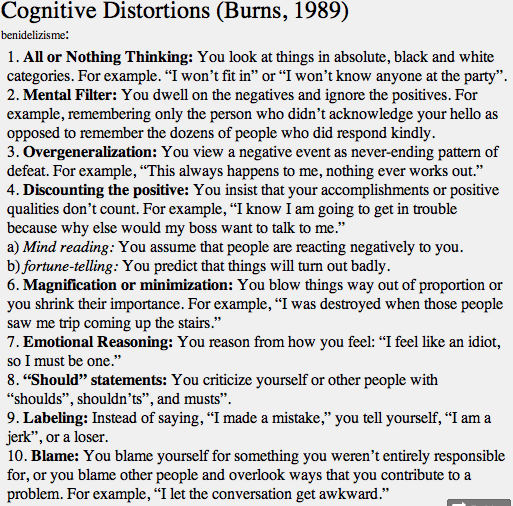 Moreover, we think we’ll never find love (overgeneralizing)!
Moreover, we think we’ll never find love (overgeneralizing)!
In the examples of overgeneralization above, it’s pretty clear that overgeneralizing unnecessarily leads to painful emotions. What’s also evident is that in each of these examples, the overgeneralization was a pretty inaccurate assumption. Working off of a faulty assumption and believing the distortion to be true, it becomes even harder to put any effort toward achieving your goals. Then your overgeneralizing conclusion might turn out to be true!
Overcoming Overgeneralizing With Cognitive Reappraisal
Usually, when we experience setbacks, painful emotions go along with them. The stronger the emotion, the more likely it is to influence our thinking and result in us believing a distortion, such as overgeneralization. Fortunately, we can reverse this pattern by being more introspective: examining our own thinking in order to come to a more balanced, reasonable perspective.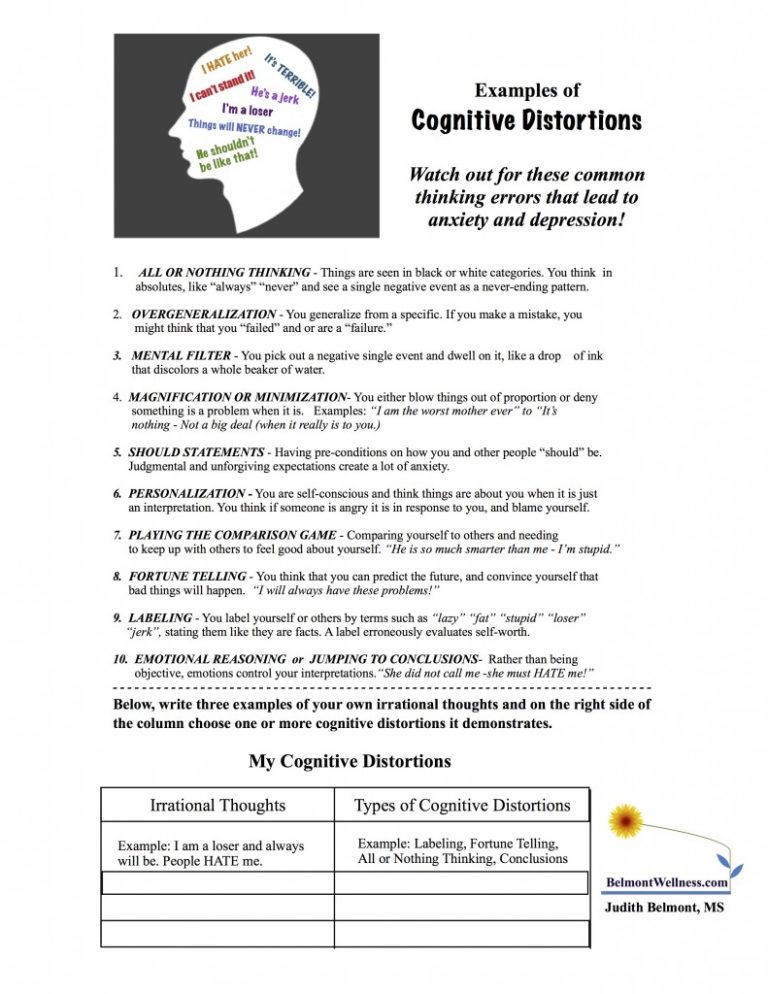 This process is called cognitive restructuring or cognitive reappraisal. Cognitive behavioral therapy has numerous techniques and exercises for investigating the validity of cognitive distortions such as overgeneralizing, and distancing ourselves from these unhelpful thought patterns. A useful skill to help us let go of our attachment to overgeneralizing is to intentionally investigate our thoughts from a number of angles:
This process is called cognitive restructuring or cognitive reappraisal. Cognitive behavioral therapy has numerous techniques and exercises for investigating the validity of cognitive distortions such as overgeneralizing, and distancing ourselves from these unhelpful thought patterns. A useful skill to help us let go of our attachment to overgeneralizing is to intentionally investigate our thoughts from a number of angles:
6 Steps to Stop Overgeneralizing
Step 1: Ask yourself: What are the costs and benefits of thinking this way? In other words, is it worth being so attached to this way of thinking? Does this kind of thinking protect you from anything? Is it harmful? If this thought costs you more than you’re gaining, it makes sense to develop more effective ways of reacting to the situation by going through the next five steps.
Step 2: Collect the evidence that supports this thought. Are you basing your conclusion on a lot of relevant data, or just one or two data points? Is there significant evidence against this particular thought? Is there a way to consider both the evidence against this thought and evidence supporting it when thinking about this situation? Would the evidence you’re considering hold up in court, or is it too flimsy?
Step 3: Based on the current facts, do you think everyone would draw the same conclusion as you? If not, why not? Are they seeing something you’re not? Would other interpretations be more effective in coping or in achieving your desired outcome? If someone were handling this situation more effectively, how might their thinking be responsible for their success?
Step 4: Take a step outside of your own head for a moment: Pick a friend. If this friend came to you and told you the same thing was happening to them, what would you tell them? Is it different than what you’re telling yourself right now? Consider why you might be giving your friend different advice than you’re giving yourself, and whether this is helpful. Would you tell a friend what you are telling yourself? If not, why not?
If this friend came to you and told you the same thing was happening to them, what would you tell them? Is it different than what you’re telling yourself right now? Consider why you might be giving your friend different advice than you’re giving yourself, and whether this is helpful. Would you tell a friend what you are telling yourself? If not, why not?
Step 5: Do you think you’re relying on the actual evidence, or is it possible you’re letting your feelings guide your thinking about this matter? Emotions have a tendency to color our thinking, altering the conclusions we make, and exacerbating natural errors in thinking. If you were feeling better or were in a better mood, what’s your best guess as to how you’d think about this situation?
Step 6: Identify examples of this interpretation not being true. What are the exceptions to this conclusion? Now identify some more examples…
Looking at the thought from new perspectives helps us to soften our attachment to old patterns of thinking like overgeneralization.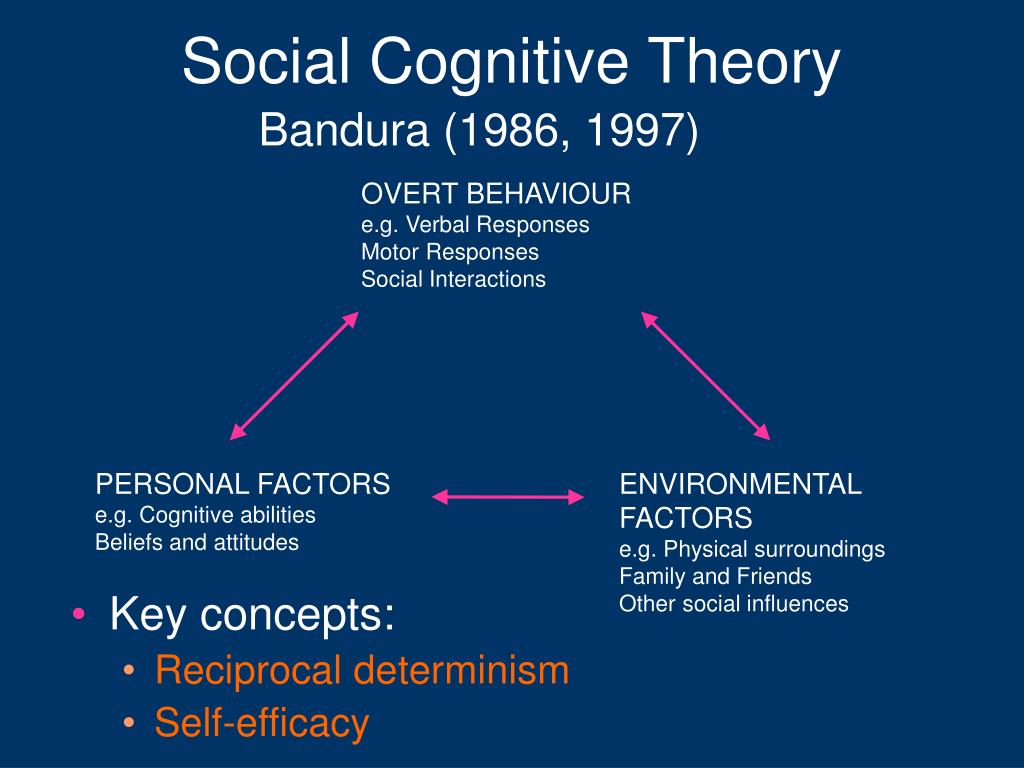 The best way to use these steps is to first identify the situations where you usually engage in this sort of distortion and apply the steps to them. You can even plan ahead by rehearsing these steps both before and during the situation. And don’t feel you have to be totally convinced of some other thought for this process to work. Just the act of taking on new ways of thinking can result in our emotions settling down, and our thinking becoming more flexible.
The best way to use these steps is to first identify the situations where you usually engage in this sort of distortion and apply the steps to them. You can even plan ahead by rehearsing these steps both before and during the situation. And don’t feel you have to be totally convinced of some other thought for this process to work. Just the act of taking on new ways of thinking can result in our emotions settling down, and our thinking becoming more flexible.
Cognitive behavioral therapy is devoted to identifying similar patterns of thinking and helping people develop healthier thinking habits. There is significant scientific research showing cognitive behavioral therapy is the most effective treatment for a whole host of problems. Click here to learn more about cognitive therapy.
Copyright © Cognitive Behavioral Therapy Los Angeles, 2016
Updated 2022
Top 15 cognitive biases | PSYCHOLOGIES
122,544
Knowing Yourself A Human Among Humans
Generally, our mind uses cognitive distortions to reinforce some kind of negative emotion or negative line of reasoning.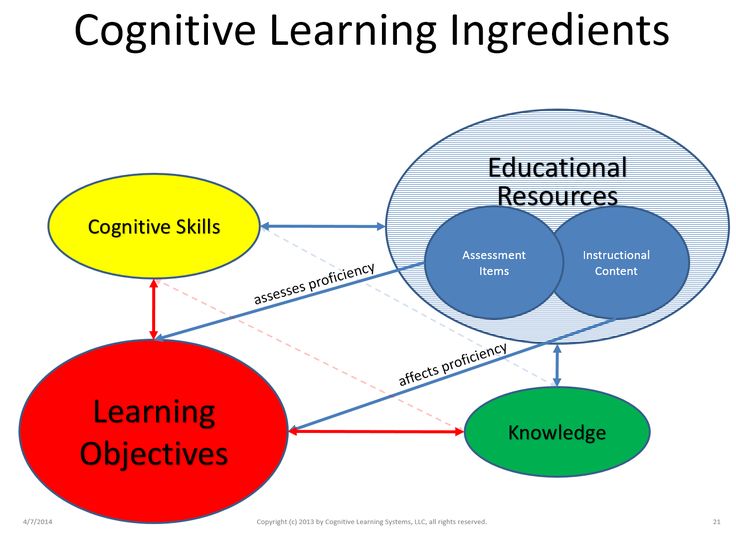 The voice in our head sounds rational and authentic, but in reality only reinforces our poor opinion of ourselves.
The voice in our head sounds rational and authentic, but in reality only reinforces our poor opinion of ourselves.
For example, we say to ourselves, "I always fail when I try to do something new." This is an example of "black and white" thinking - with this cognitive distortion, we perceive the situation only in absolute categories: if we fail in one thing, then we are doomed to endure it in the future, in everything and always.
If we add “I must be a complete loser” to these thoughts, this is an example of overgeneralization - such a cognitive distortion generalizes ordinary failure to the scale of our entire personality, we make it our essence.
Here are the main examples of cognitive distortions that are worth remembering and practicing, tracking them and responding to each in a more calm and measured way.
1. Filtering
We focus on the negative while filtering out all the positive aspects of the situation. Obsessed with an unpleasant detail, we lose objectivity, and reality is blurred and distorted.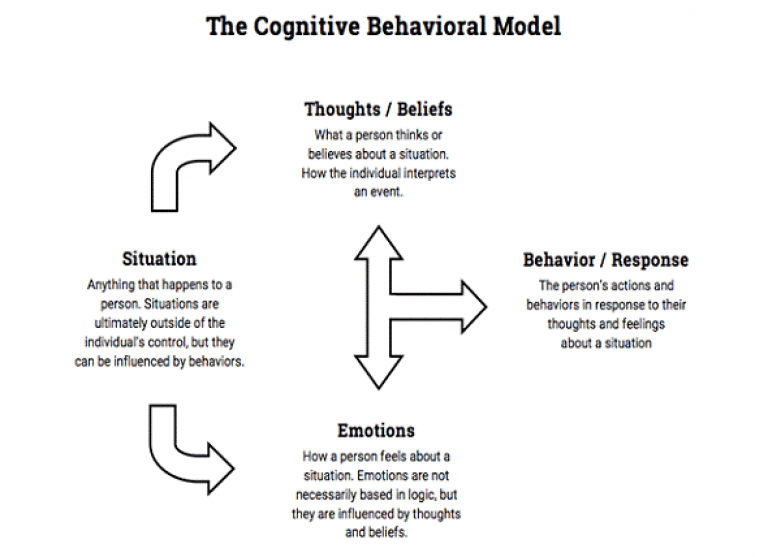
2. Black and white thinking
With black and white thinking, we see everything either in black or in white, there can be no other shades. We must do everything perfectly or we will fail - there is no middle ground. We rush from one extreme to another, not allowing the idea that most situations and characters are complex, composite, with many shades.
3. Overgeneralization
With this cognitive distortion, we come to a conclusion based on a single aspect, a "piece" of what happened. If something bad happens once, we convince ourselves that it will happen again and again. We begin to see a single unpleasant event as part of an endless chain of defeats.
4. Jumping to conclusions
The other person hasn't said a word yet, and we already know exactly what he feels and why he behaves the way he does. In particular, we are confident that we can determine how people feel about us.
For example, we may conclude that someone does not love us, but we will not lift a finger to find out if this is true. Another example: we convince ourselves that things will go wrong, as if it were a fait accompli.
Another example: we convince ourselves that things will go wrong, as if it were a fait accompli.
5. Injection
We live in anticipation of a catastrophe that is about to break out, ignoring the objective reality. The same can be said about the habit of minimizing and exaggerating. When we hear about a problem, we immediately turn on “what if? ..”: “If this happens to me? What if tragedy happens?
We exaggerate the importance of minor events (say, our own mistake or someone else's achievement) or, conversely, mentally reduce an important event until it seems tiny (for example, our own desired qualities or the shortcomings of others).
6. Personification
With this cognitive distortion, we believe that the actions and words of others are a personal reaction to us, our words and actions. We also constantly compare ourselves to others, trying to figure out who is smarter, better looking, and so on.
In addition, we can consider ourselves the cause of some unpleasant event, for which we objectively do not bear any responsibility.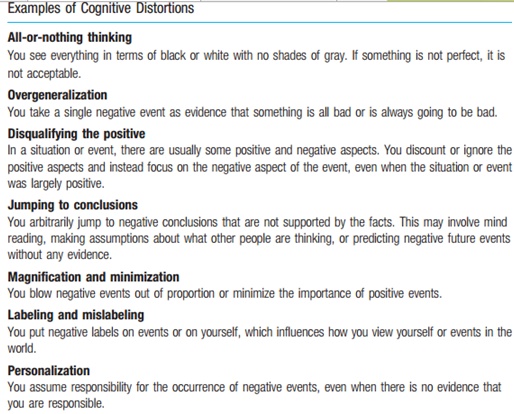 For example, a skewed chain of reasoning might be: “We were late for dinner, so the hostess dried the meat. If only I had hurried my husband, this would not have happened.
For example, a skewed chain of reasoning might be: “We were late for dinner, so the hostess dried the meat. If only I had hurried my husband, this would not have happened.
7. False conclusion about control
If we feel that we are controlled from the outside, then we feel like a helpless victim of fate. The fallacy of control makes us responsible for the pain and happiness of everyone around us. "Why are not you happy? Is it because I did something wrong?
8. False conclusion about fairness
We feel offended that we have been treated unfairly, but others may have a different point of view on this matter. Remember, as children, when things didn't go the way we wanted them to, adults would say, "Life isn't always fair."
Those of us who judge every situation "fairly" often end up feeling bad. Because life is sometimes "unfair" - not everything and not always develops in our favor, no matter how much we would like it.
9. Blame
We believe that other people are responsible for our pain, or vice versa, we blame ourselves for every problem.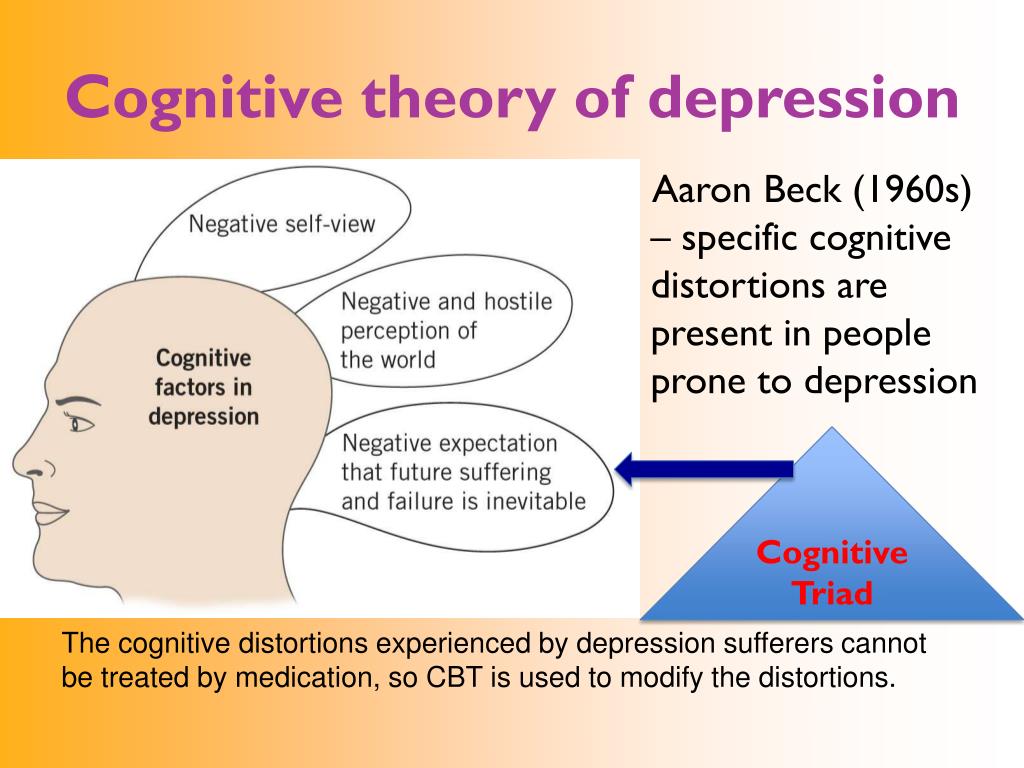 An example of such a cognitive distortion is expressed in the phrase: “You keep making me feel bad about myself, stop it!” No one can "make you think" or make you feel - we ourselves control our emotions and emotional reactions.
An example of such a cognitive distortion is expressed in the phrase: “You keep making me feel bad about myself, stop it!” No one can "make you think" or make you feel - we ourselves control our emotions and emotional reactions.
10. "I (shouldn't)"
We have a list of ironclad rules about how we and the people around us should behave. Anyone who breaks one of the rules causes our anger, and we get angry at ourselves when we break them ourselves. We often try to motivate ourselves with what we should or should not, as if we are doomed to receive punishment before we do anything.
For example: “I have to go in for sports. I shouldn't be so lazy." “Must”, “must”, “should” are from the same series. The emotional consequence of this cognitive distortion is guilt. And when we take a "should" approach to other people, we often feel anger, impotent rage, frustration, and resentment.
11. Emotional arguments
We believe that what we feel must automatically be true.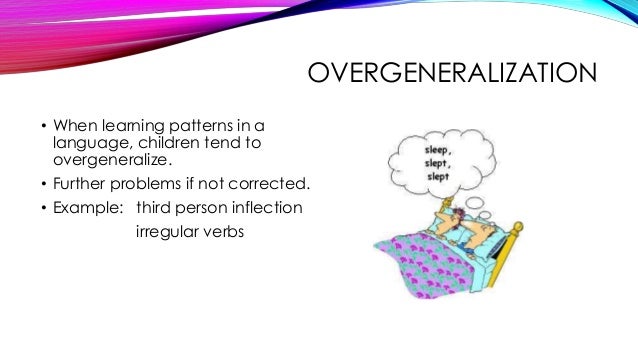 If we feel stupid or boring, then we really are. We take for granted how our unhealthy emotions reflect reality. "That's how I feel, so it must be true."
If we feel stupid or boring, then we really are. We take for granted how our unhealthy emotions reflect reality. "That's how I feel, so it must be true."
12. False conclusion about change
We tend to expect others to change to suit our desires and demands. You just need to press or cajole properly. The drive to change others is so persistent because we feel like our hopes and happiness depend entirely on those around us.
13. Labeling
We generalize one or two qualities to a global judgment, we take the generalization to the extreme. This cognitive bias is also called labeling. Instead of analyzing the error in the context of a particular situation, we attach an unhealthy label to ourselves. For example, we say “I am a loser” after failing in some business.
Faced with the unpleasant consequences of someone's behavior, we can attach a label to the person who behaved in such a way
“He/she constantly throws his children at strangers” - about a parent whose children spend every day in kindergarten.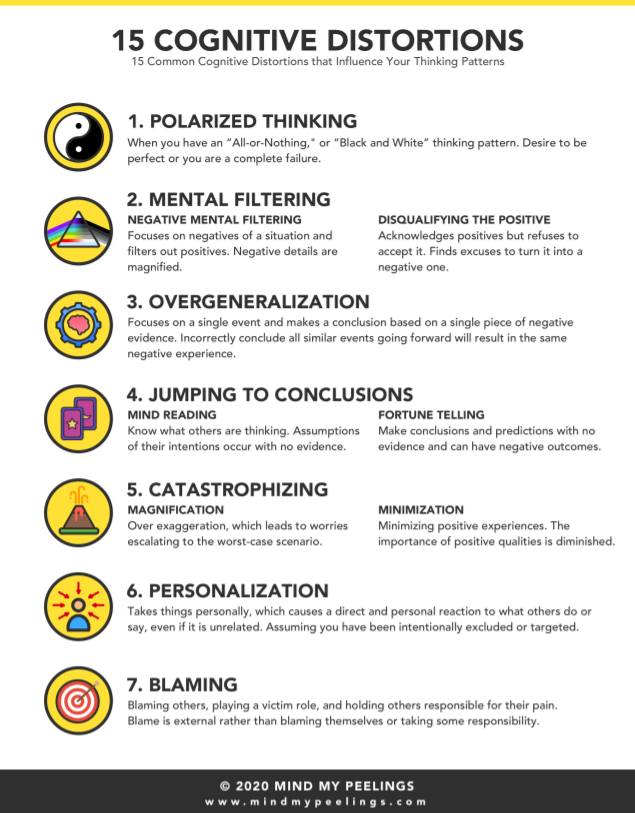 Such a label is usually charged with negative emotions.
Such a label is usually charged with negative emotions.
14. Desire to always be right
All our life we try to prove that our opinions and actions are the most correct. Being wrong is unthinkable, so we go to great lengths to demonstrate that we are right. “I don’t care if my words hurt you, I will still prove to you that I am right and win this argument.” The consciousness of being right for many is more important than the feelings of people around, including even those closest to them.
15. False conclusion about the reward in heaven
We are sure that our sacrifices and caring for others to the detriment of our own interests will surely pay off - as if someone invisible is keeping score. And we feel bitter disappointment when we do not receive the long-awaited reward.
Text: Ksenia Tatarnikova Photo Source: Unsplash
New on the site
“I fell in love with a married man twice my age. I can't understand how he feels about me.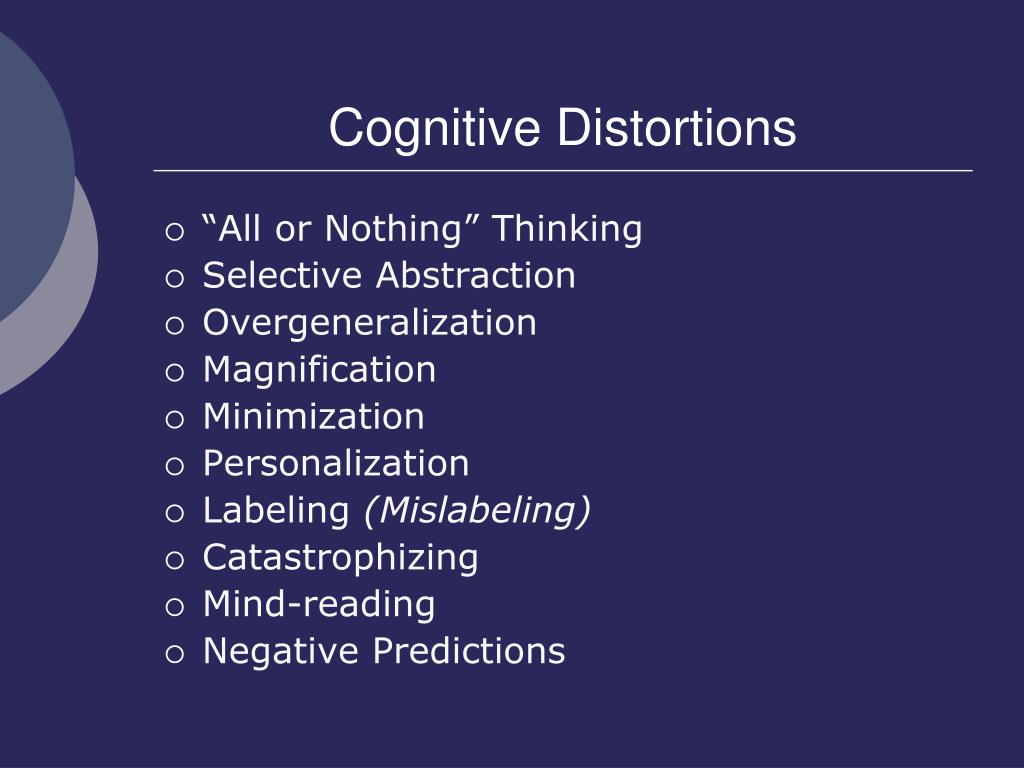 ”
”
“I'm afraid of my own child. How to communicate with a teenager?
“You can’t do it this way”: 8 things that will not spoil, but only strengthen your relationship "The Secret of Coco"?
“I hear constant prohibitions from the guy, we often quarrel. How to stop these eternal scandals?
What genre do you live in: comedy, detective story, drama? How to change your outlook on life
11 cognitive distortions that make you think that everything in life is bad
What to do when the whole world is against you
Do you know the feeling when it seems that the whole world is against you?
When does it feel like you're surrounded by idiots? That nothing will change in your life and you will be a loser?
If you answered yes to any of the questions above, chances are you are a miserable whiner. But don't worry, it can be fixed. Surely you are a good person who simply allowed not the most pleasant thoughts to take over his mind.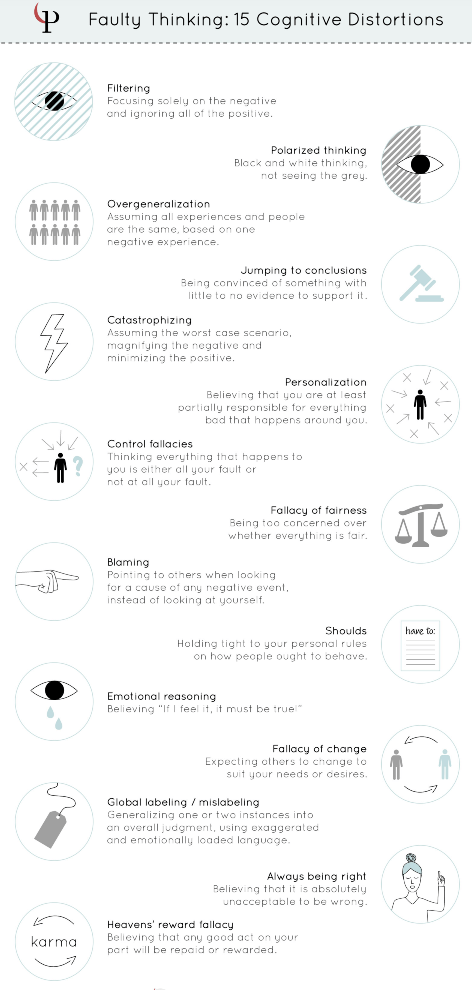
At least that's what psychologist David Burns thinks in his book Feeling Good: The New Mood Therapy, which helped popularize CBT. Burns identifies 11 common cognitive biases that make people feel completely unhappy.
These distortions are erroneous thought patterns that make the world around you icteric and nauseating when you start thinking about how you feel about yourself and those you know. According to the postulates of cognitive behavioral therapy, the main reason why people feel unhappy is that their thoughts are on edge. Correct erroneous mental models, and you will get rid of negative feelings.
We at 1Gai.ru have collected 11 distortions that make people feel unhappy. With definitions from Burns and a checklist to help you recognize distortion in your own life.
1. All or Nothing Thinking
Alex Padurariu / unsplash.com
You think in black and white terms, as if there are no shades of gray in life.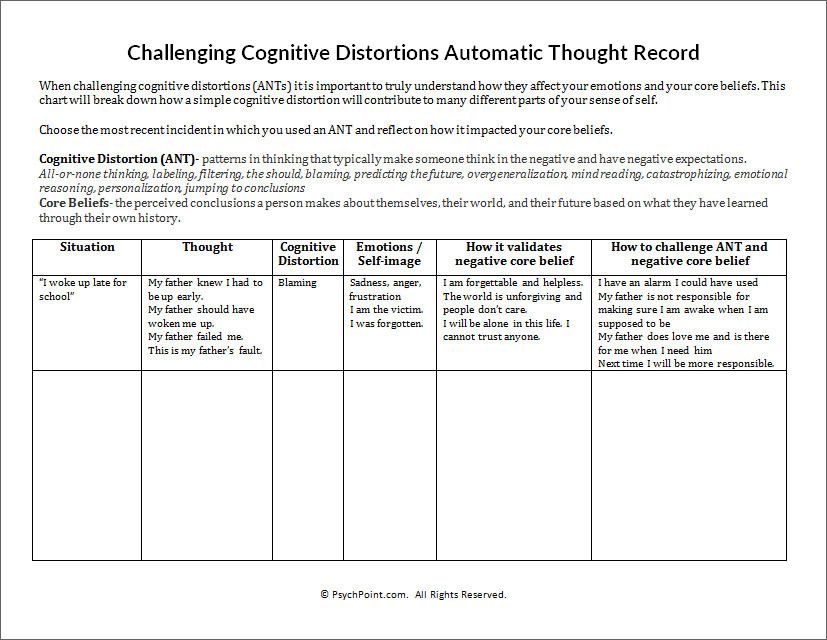
"If I never write a bestseller, I'll be a failure all my life."
"What I believe is not perfect, so it's all a lie."
"She forgot my birthday, so it's better not to build a relationship with her."
But the reality is that most things in our lives are not black and white. Such dualistic thinking is not true. Life is full of nuances. A goal can be worthwhile, even if it doesn't involve absolute success. And something good can always be found both in imperfect people and in imperfect philosophy.
See also
9 cognitive distortions that involuntarily change our behavior
2. Excessive generalization
Hannah XU / UNSPLASH.com
You summarize a specific deficiency, failure or error and error and error and error and error project it onto yourself. Or you are projecting current feelings and some negative experience that you just had into the future.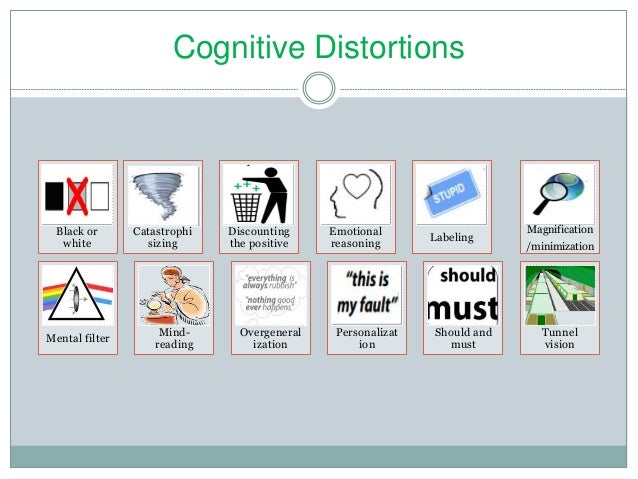
Overgeneralization is when you give too much importance to discrete disorder. For example, you make a mistake in a work paper and decide that you are incompetent in the profession. Take it out on your kids and decide you're a bad parent.
Overgeneralization is often associated with the words "always" and "never": you make a sharp comment to your girlfriend and think: "I always ruin my relationship." You skip one workout and immediately say, "I'll never get in shape."
You can apply generalization not only to yourself, but also to other people. Take a specific flaw and decide that it indicates the character of the person as a whole. For example, because your colleague whistles annoyingly, you think that he is inattentive. Completely forgetting that he always brings something delicious to meetings and helps troubleshoot software.
3. Mental filtering
Abigail / unsplash.com
You ignore the positive and focus entirely on the negative.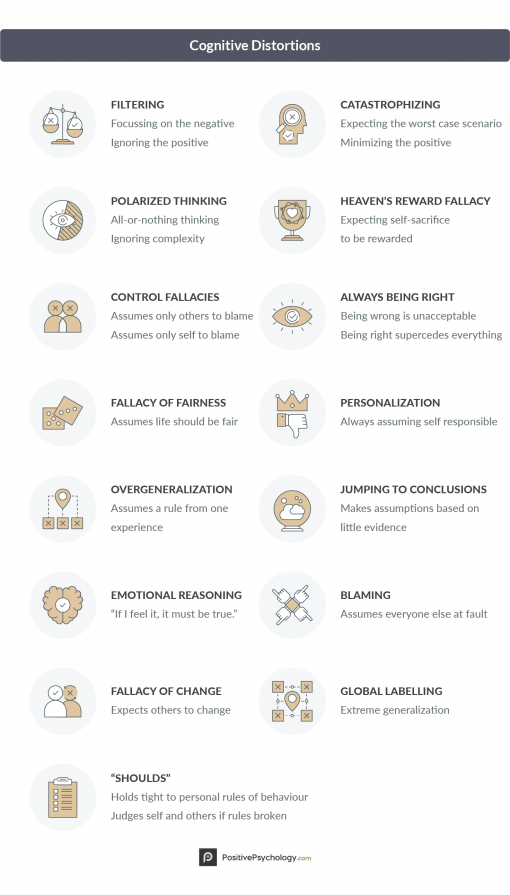
Your mind is like duct tape for negatives and Teflon for positives. Bad things are constantly stuck in your head, and good things float away into the realm of unconsciousness.
See also
7 signs that will help you understand that you have low self-esteem
4. Devaluing the positive
Zac Durant / unsplash.com
You convince yourself that your positive qualities or successes do not count.
This is due to mental filtering. The difference is that you recognize positive qualities in yourself or in another person, and then convince yourself that they mean nothing.
"My last idea was highly appreciated, but it won't get me any closer to a promotion."
"Yes, I've lost some weight this week, but it doesn't matter because I still look fat."
"This woman may have said that I look good, but probably only for the sake of appearances.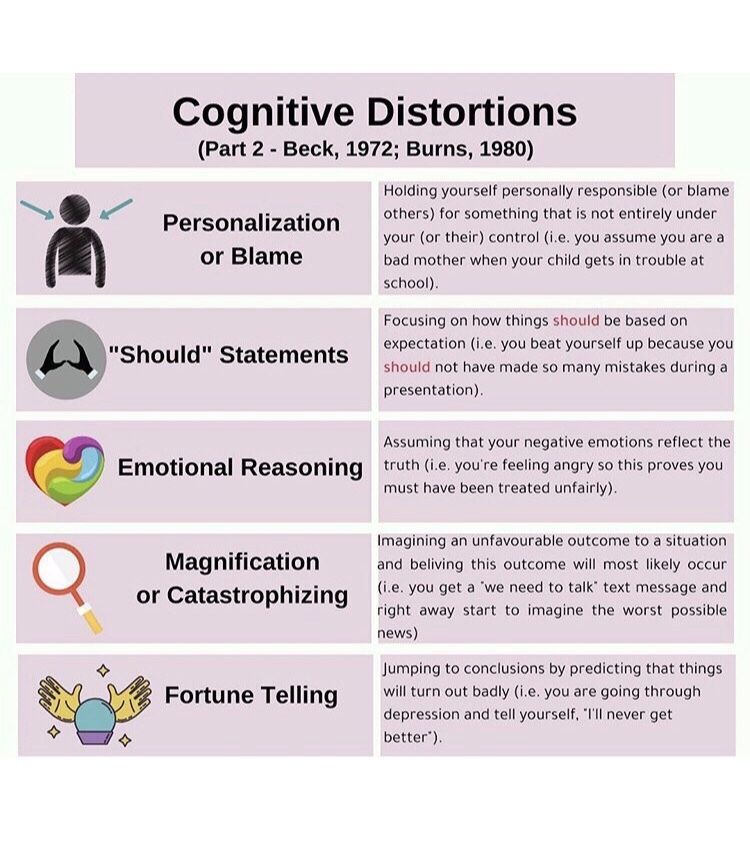 "
"
5. Mind Reading
You jump to conclusions about what others think and feel without any hard evidence.
We can't read minds, but that doesn't stop us from trying. And when we do this, we usually assume - without any reason or evidence - that they think something bad about us.
"The boss didn't say anything after my presentation... She probably thinks I did a bad job."
"This woman smirked at me because I'm unattractive."
"My friend didn't reply to my message because I'm not important to her."
6. Catastrophism
Carolina Heza / Unsplash
You make arbitrary and disturbing predictions about the future.
You make seemingly logical leaps between a catalytic cause and subsequent potential effects. And thus you create a chain, which eventually leads to an illogical final conclusion. For example:
“I got a D in math. This means that you can forget about a good GPA in the certificate.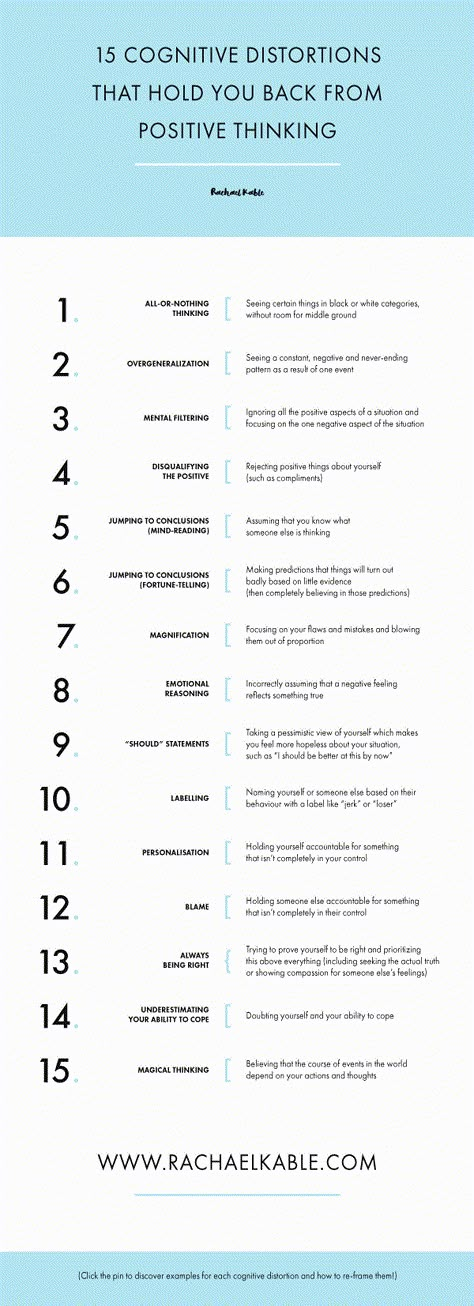 If there is no certificate, there will be no good work. You will have to live with your parents for the rest of your life.”
If there is no certificate, there will be no good work. You will have to live with your parents for the rest of your life.”
A little jump in this way of thinking seems reasonable. But it is unlikely that the chain leading from a low grade at the university to a lonely old age can be considered logical.
See also
28 psychological facts that really work
7. Exaggeration and Minimization
Einar H. Reynis / unsplash.com
You exaggerate the negative and downplay the positive.
Seeing the world through a lens that magnifies the negative and minimizes the positive - a lens of constant pessimism - contributes to depression and decreased motivation. If you only see the flaws in your job (cold boss) and minimize the positives (nice colleagues), you'll find it hard to get out of bed every morning.
8. Emotional thinking
Joanna Nix-Walkup / unsplash.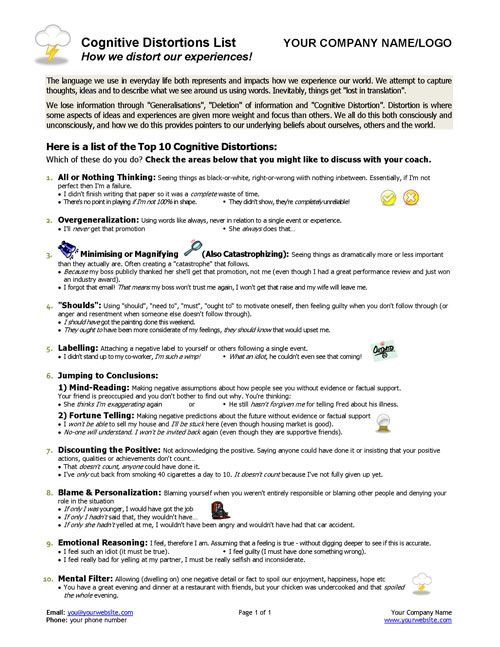 com
com
Sense-based reasoning: “I feel like an idiot, so I should be” or “I feel hopeless, so I never will get better."
After a terrible fight with your significant other, you think, "She's the worst person in my life and we have no future." And after a romantic date, they are sure: “She is the only one for me. I've never been so happy."
So which of these is true?
Feelings fluctuate. And while emotions can be a source of reasoning, they need to be trained to match your intelligence. People who engage in maladaptive emotional reasoning completely replace consciousness with feeling. As a result, the latter becomes their reality.
If they feel bad, there must be something wrong with them or with the world around them. But this is not always the case. Sometimes you feel sluggish for no specific reason. Sometimes you suffer from "emotional contagion", and a bad day at work starts to affect your relationship with your family. Sometimes circumstances overlap and form a cluster of chaos.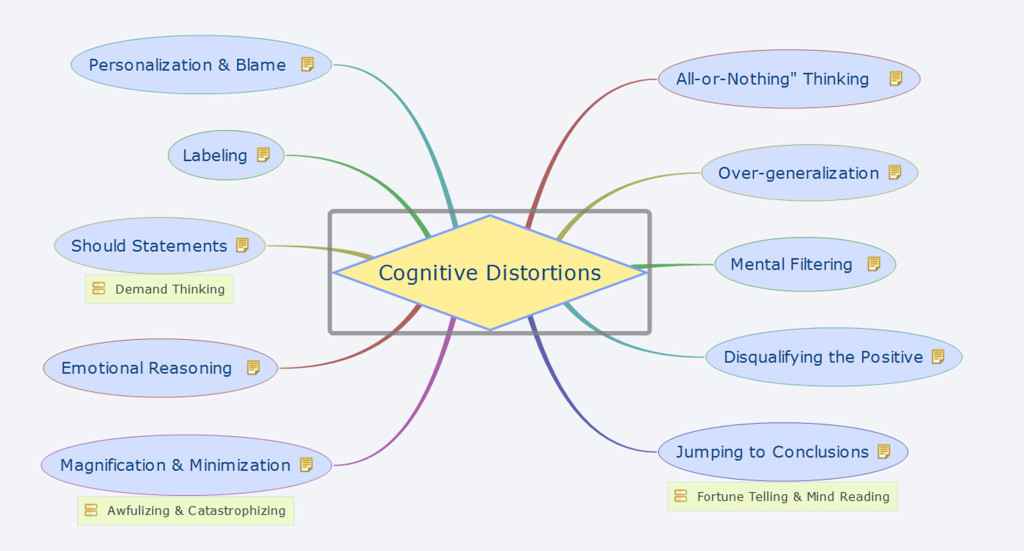 But they also represent a deviation, not the norm, from which any conclusions can be drawn.
But they also represent a deviation, not the norm, from which any conclusions can be drawn.
See also
Without a smartphone: 9 things to think about to pass the time
9. Statements of necessity
Jackson Simmer / unsplash.com from the “you should” category
“Must” are expectations and standards that are arbitrary in nature. We can feel guilty when we don't live the way we think we should (even if we don't have to). We get angry and upset when people and the way the world works do not match our expectations. Even if these expectations are unfair and unfounded.
10. Labeling
Andrew Coop / unsplash.com
This is an extreme form of overgeneralization in which you try to establish the "essence" of yourself or other people with a single word label.
If overgeneralization occurs when we draw general conclusions based on one particular belief or behavior, then in labeling we completely ignore ourselves or others, grouping difficult people into one-dimensional categories:
"You've lost your temper again, so you're a loser.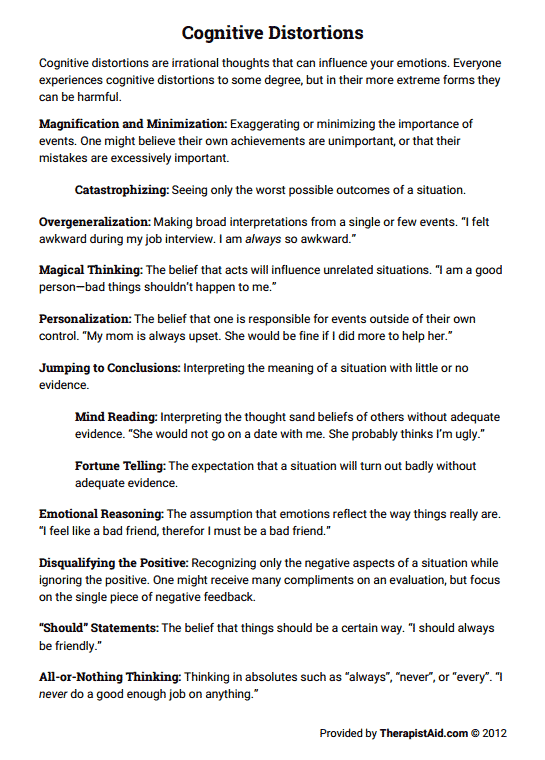 "
"
"Your brother didn't repay my debt, he's a swindler!"
"If someone belongs to political party X, he is a jerk."
See also
6 psychological reasons that will explain why you are a hypersensitive person
11. Personalization and accusation
Micerindersblog.org
9000 You blame yourself for the fact that you were outside your zone responsibility. And you blame others, not noticing how you yourself could contribute to the conflict.
When errors and conflicts occur, their cause is complex. Often the problem occurs not only with you, but also with another person.
How to get rid of
So how to get rid of these inadequate mental scenarios?
Step 1. Easy to recognize. Beware of cognitive distortions when talking to yourself and others.
Step 2. Challenge your negative thought patterns.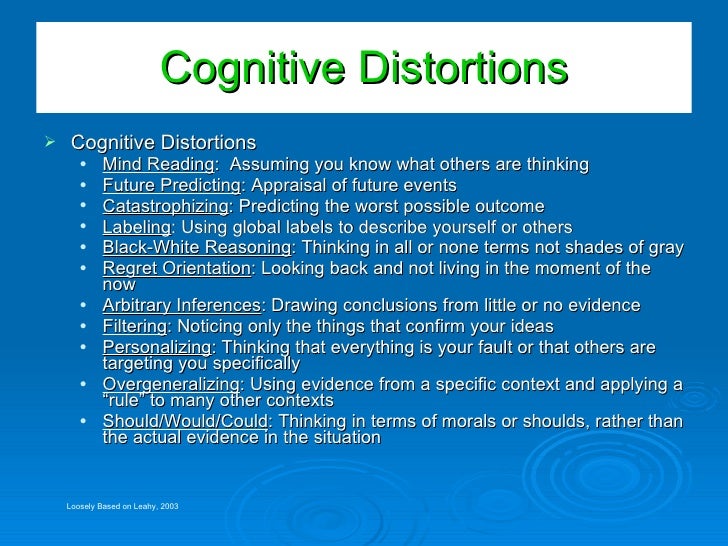
If you make a mistake at work and think you're a failure, ask yourself if that's true. Yes, the report turned out to be imperfect, but in other areas of life you are still doing well. You have a happy family. You are confidently moving towards your fitness goal. And most of the working days do not make such mistakes. So no, you are not a loser.
Do the same if you catch yourself making cognitive biases about others. Yes, sometimes people can be annoying and you may not agree with them, but that doesn't mean they're incorrigible. People are multifaceted beings. They cannot be understood by focusing on one feature, or described in one word. A person can be annoying, vain, generous and hardworking at the same time.
Look for the good in your life and in others, and then let it really take hold in your mind.
Eliminating cognitive biases is a skill that takes practice to develop. Don't expect immediate results and prepare for failure. However, time will pass and you will be able to rewrite the scripts that made you feel like a miserable loser.